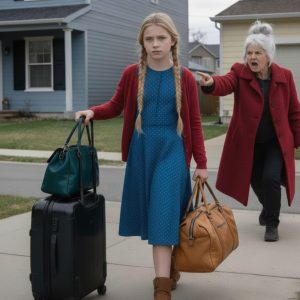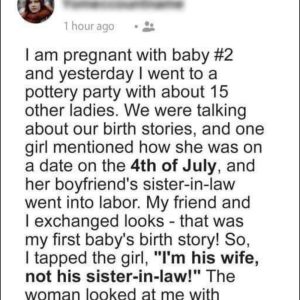The story begins in a somber reception hall, where adults murmured condolences and tried to navigate grief with quiet restraint, but the emotional weight was heavy and unspoken. In the middle of this tense atmosphere, four-year-old Ben played beneath the banquet tables, blissfully detached from the complicated emotions surrounding the funeral. His innocence stood in stark contrast to the adults’ unease. When he emerged, something in his expression shifted. He tugged at his mother’s dress and whispered a startling confession: he had seen his father touching another woman’s leg. In that single moment, the narrator felt a jolt of disbelief and denial. Her mind scrambled to rationalize his words as childish confusion, but his small finger pointed directly at Rachel, a longtime “family friend” whose presence had always lingered just on the edge of suspicion. What had seemed like an innocent friendship now felt charged with meaning, and months of subtle warning signs resurfaced all at once.
As the narrator scanned the room, memories clicked into place: the unexplained overtime shifts Arthur insisted on, the phone flipped face-down the instant he walked through the door, and the way he and Rachel seemed to drift together at gatherings, always sharing a private orbit just outside of others’ attention. These clues, once dismissed as paranoia or insecurity, now formed a coherent picture that was impossible to ignore. Even so, she chose not to confront him at his father’s funeral, recognizing that doing so would blur grief, anger, and betrayal in a moment already fraught with emotion. She carried her son’s whispered words home like a splinter beneath the skin—small, quiet, but impossible to forget. That night, when the house settled into silence, she approached Arthur with calm and caution, asking just how close he and Rachel truly were. His defensiveness, sharp tone, and evasive anger spoke the truth he refused to voice outright, confirming her deepest fears without a single admission.
Left alone with suspicion and instinct, the narrator decided to seek proof rather than arguments. By dawn, she accessed an old shared work email account Arthur had forgotten existed. What she found there transformed suspicion into certainty. Months’ worth of intimate messages, hotel reservations, and photographs—evidence of secret meetings that coincided precisely with the nights he claimed to be “working late.” The betrayal stretched back into the very fabric of their marriage, revealing a pattern of deceit woven silently through nearly a decade. The discovery shattered not just trust but the narrative of their life together. Rather than confront him emotionally, she acted with strategic clarity. She printed every file, contacted a trusted lawyer, and began to quietly build her exit. All the while, Arthur continued performing the role of grieving son, expecting sympathy and patience, unaware that the foundation beneath his lies had finally cracked.
When the divorce process began, it unfolded with striking finality. A month later, a process server delivered the papers, and Arthur reacted not with remorse but stunned disbelief—evidence that he had never imagined consequences would follow. Men who grow accustomed to the safety of their own lies rarely anticipate accountability. In court, the documents she gathered spoke louder than arguments or accusations. The truth was undeniable, factual, and thorough. The outcome favored her decisively: full custody of Ben and, in an unexpected twist, a significant portion of Arthur’s late father’s company placed legally in their son’s name. The ruling marked not just the end of a marriage but a decisive shift in power, security, and future direction. What began as a whisper under a table had grown into a powerful reckoning that reshaped every part of their lives.
In the aftermath, life settled into a quieter, gentler rhythm—one defined not by suspicion but peace. The home transformed emotionally, becoming brighter and safer, free from the subtle tension that had once shadowed every morning and evening. Daily routines that once felt strained—breakfasts, conversations, laughter—now unfolded naturally, filled with warmth and calm. The narrator discovered a sense of inner freedom she hadn’t realized she’d lost. Her bond with Ben deepened as they built a life grounded in honesty and stability rather than denial. Small moments—his arms around her neck, his soft questions, the scent of his shampoo—became reminders of what truly mattered. When he asked whether she was happy, she could answer with sincerity, recognizing happiness not as a fragile illusion but as a solid truth reclaimed through courage and clarity.
Ultimately, the story reveals that the pivotal moment wasn’t destructive but transformative. The whispered words of a child—a voice untouched by fear, guilt, or adult rationalization—became the catalyst for truth. Rather than tearing the family apart, that innocence illuminated what had been hidden, making space for healing and a new beginning. The narrative underscores how sometimes the smallest voice can carry the greatest strength, guiding someone toward a life they didn’t realize they deserved. It highlights the difference between living inside denial and stepping into honesty, between clinging to a broken structure and choosing liberation. The real turning point wasn’t the affair itself but the decision to confront reality with dignity and decisive action. Some revelations don’t destroy—they reveal, they mend, and they lead us forward. In this case, the true inheritance was not pain, but clarity, resilience, and a future defined by genuine peace rather than illusion.





